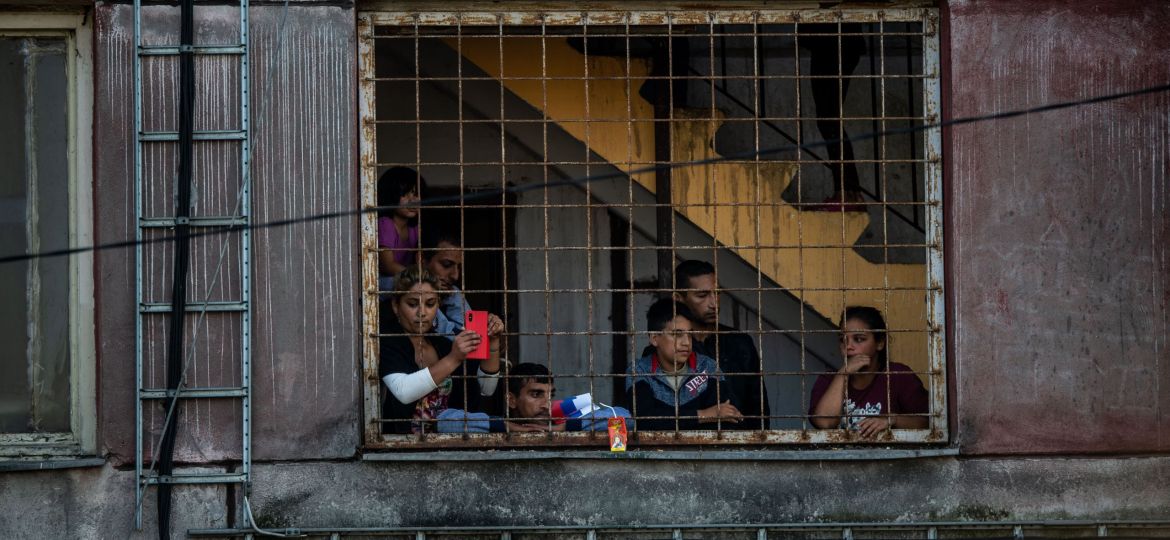
An old hoax about alleged benefits enjoyed by the Czech Republic’s Roma population has once again begun to spread on social media in early 2022. This time, a social media post claims that the city of Most is covering the costs of public transportation, taxis and spa access for members of the Roma minority. This is false; both the mayor of Most and the national Roma organisation denied it, with the latter pointing out that various versions of this hoax have been circulating for nearly 10 years.
The January 9, 2022 Facebook post claims to be a first-person experience of a pensioner from eastern Zlín visiting Most, who allegedly witnessed inspectors on the trams checking tickets of “all passengers except for the Romani youth”, who “can ride for free”. The text goes on to say that the Roma people of Most also enjoy a free taxi ride once a month, have “free spa passes” and “if they buy a washing machine or a refrigerator” it is “paid for by the city”.
The post ends by saying: “I am 65 years old and what I don’t pay for, I don’t have. I’ve worked all my life, paid taxes, but nobody gives me anything for free.”

None of those claims are true, as Most mayor Jan Paparega confirmed in a February 1 statement, which says: “Recently, a several years old hoax began circulating on the internet again, claiming that the Roma in Most have free public transportation and access to swimming pools and that the town is paying for their taxi rides. The city doesn’t do that, and it does not buy refrigerators or washing machines for anyone.”
Paparega warned that this information “is not only untrue, but also very dangerous, because it contributes to the escalation of social tensions in our society.”
Price concessions on public transport in Most, according to the current legislation, apply to children up to 15 years old and seniors over 65, so “they are determined by no other measure but age,” Paparega said. “In addition, since January 2012, the city of Most hasn’t been paying social benefits, as this activity was transferred to the labour offices during the reorganisation of the public administration,” the mayor of Most added in a statement.
Zdeněk Ryšavý, director of the organisation Romea, confirmed to AFP that this is an old and recurring hoax. “Of course there are no such benefits for Romani people anywhere in the Czech Republic,” Ryšavý told AFP in an interview on 7 February 2022. “The palette of hoaxes concerning Romani people is inexhaustible.” According to Ryšavý, a variation of this hoax appeared in 2010 in Havířov, and then a few more times in Most. The exact same text was refuted by the Most mayor’s office as early as 2013, while in 2014 false posts circulated claiming that Roma people had free access to local swimming pools.
Lies about members of the Roma minority enjoying special privileges appear across the Central and Eastern European region. AFP has already reported on similar cases not only in the Czech Republic (1, 2) but also in Slovakia (1, 2, 3, 4).
The Roma minority has long been a target of misinformation. According to sociologist and former parliament deputy Ivan Gabal, such tactics were used in the past primarily by municipal politicians in the relatively poor regions of Ústí nad Labem and Ostrava, and later by the far-right, anti-minorities SPD party of Tomio Okamura, which targets primarily low-income voters.
This type of hoax “is designed to awaken the wrath of the low-income voter by showing the minorities as lazy ‘freeloaders'”, Gabal told AFP on 7 February in an email. Labels such as”freeloader” are intended to give the impression, Gabal said, that “those who work have no benefits, while those who pretend to be poor and do not work have great social benefits”. The sociologist said the text might have reappeared because local elections are coming up in the fall.
According to the latest available information from 2017, there are approximately 240,300 Romani people living in the Czech Republic, which corresponds to roughly 2.2% of the population. According to the government’s 2020 report on the minority, the Roma make up 80% of the population in so-called “socially excluded localities”. About half of the Roma struggle with high debt, which makes their situation even more challenging.
